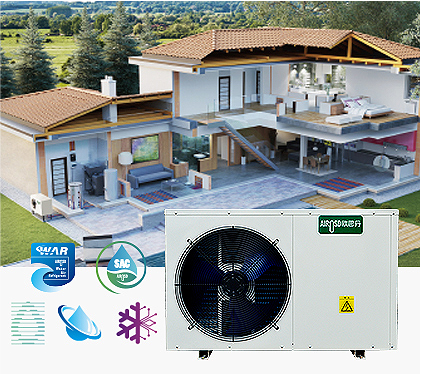Before we delve into the crux of the matter, it's important to understand what circulating water heaters are and how they work. Also known as tankless water heaters or demand-type water heaters, these devices are hailed for their energy efficiency and convenience. Unlike traditional water heaters that store water in a tank and keep it heated, circulating water heaters heat water on demand, eliminating the need for a storage tank and the energy required to keep the water in it heated.
The Problem with Traditional Water Heaters
One of the main issues with traditional water heaters is the time it takes for hot water to reach the tap. This is especially true for taps that are far from the heater. The wait time not only leads to water wastage but also wastes your time. Imagine having to wait several minutes for hot water every time you want to take a shower, wash your hands, or do the dishes. Over time, these minutes add up, leading to significant water and time wastage.

Heat Pump Water Heater Manufacturers China
The Solution: Tankless Water Heater Recirculation Pumps
This is where tankless water heater recirculation pumps come in. These devices ensure that hot water is instantly available whenever you need it. They do this by circulating the water through the heater periodically, ensuring that the water in your pipes never cools off. This means that whenever you turn on your tap, hot water is readily available, eliminating the wait time and the associated water wastage.
How Does A Tankless Water Heater Recirculation Pump Work?
A tankless water heater recirculation pump is part of a wider recirculation system that typically includes a pump and a tankless water heater, a method of recirculation, and a method of controlling the pump. The recirculation system is set up to circulate water between the furthest fixture and the water heater. This ensures that hot water is readily available at all fixtures, regardless of their distance from the heater.
The Cost of A Tankless Water Heater Recirculation Pump
While the benefits of a tankless water heater recirculation pump are clear, it's important to consider the cost. Typically, tankless water heaters with a recirculation pump cost between $250 and $450 more than units without the pump. However, if you're considering installing a new heater, a unit with a built-in recirculation pump may be your best bet as you'll save on the installation costs of a separate pump later.

The Benefits of Installing A Tankless Water Heater Recirculation Pump
Despite the higher initial cost, a tankless water heater recirculation pump can be a worthwhile investment in the long run. Here's why:
Convenience
First and foremost, a recirculation pump offers unparalleled convenience. Gone are the days of waiting around for warm water in the morning before you shower. With a recirculation pump, hot water is instantly available whenever you need it. This not only saves you time but also makes your daily routines smoother and more enjoyable.
Reduced Water Waste
In addition to convenience, a recirculation pump can help you save a significant amount of water. Every time you turn on the shower and wait for the warm water to reach you, all that water is getting wasted. According to data, an average person wastes between one and three gallons of water while waiting for the water to heat up. Over a year, a four-person household could waste over 3,000 gallons of water. By eliminating the wait time for hot water, a recirculation pump can help you reduce this wastage and contribute to water conservation.
Potential Savings on Energy Bills
While the installation costs and the costs of operation might offset the money savings at first, over time, a tankless water heater recirculation pump can lead to savings on your energy bills. This is especially true if you use a lot of water or have a large family. Since these systems are more efficient, they can help reduce your energy consumption and lower your energy bills.

Residential Heat Pump Manufacturers
Drawbacks of Recirculation Pumps
While the benefits of recirculation pumps are clear, it's important to consider the potential drawbacks before making a decision. Here are some things to keep in mind:
Upfront Investment
The biggest drawback of a recirculation pump is the upfront cost. As mentioned earlier, you can expect to pay between $250 and $450 more for a tankless water heater with a recirculation pump than for one without. If you're not skilled enough to install the pump yourself, you might also need to factor in the cost of hiring a professional.
Lukewarm Water
If you choose to save money by installing a return valve instead of a dedicated line, you might have to deal with lukewarm water when you want cold water. It can take a few minutes for the water to become completely cold, which might be a minor inconvenience for some people.
Frequent Sensor Valve Replacement
Some homeowners have reported having to replace the sensor valve every two years. This device, usually found under the sink that's furthest from the heater, can be easy or difficult to replace depending on your system. If the sensor is on the outside of the pump, the replacement is straightforward. However, if it's inside, you might need to replace the entire pump if this part fails.
Conclusion
So, is a circulating water heater worth buying? The answer to this question depends on your specific circumstances. If you value your time and convenience, have a large family, or use a lot of water, a recirculating water heater could be a worthwhile investment. On the other hand, if the upfront cost is a concern, or if you're not bothered by the wait time for hot water, a traditional water heater might be a better fit.
In the end, the decision comes down to what you value most. If you're still unsure, consider consulting with a professional who can help you weigh the pros and cons based on your specific needs and circumstances.



